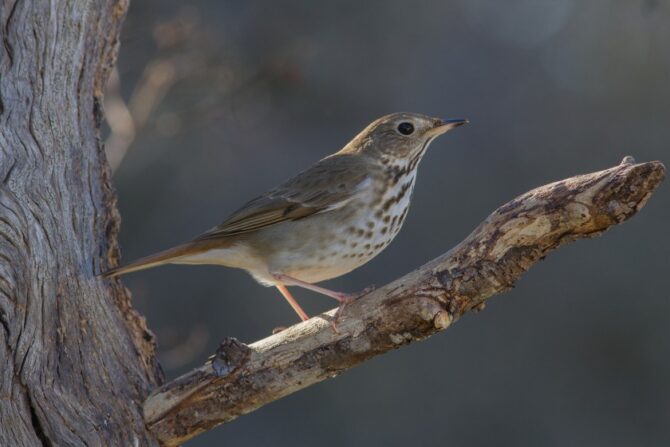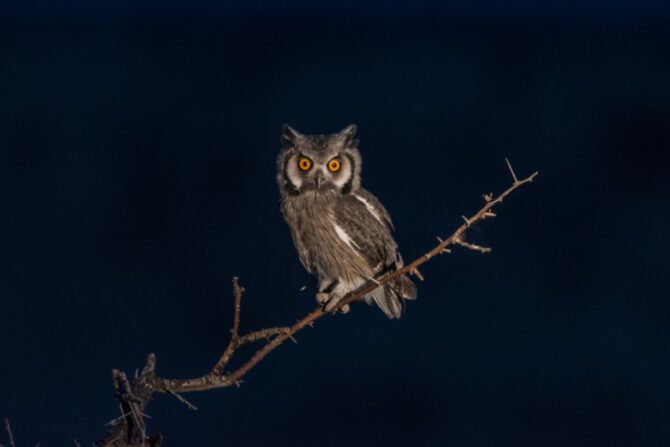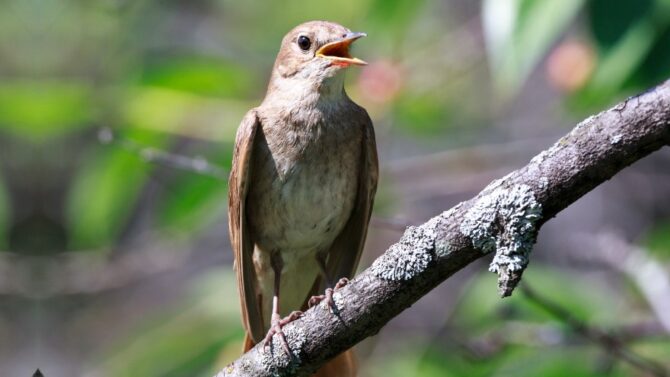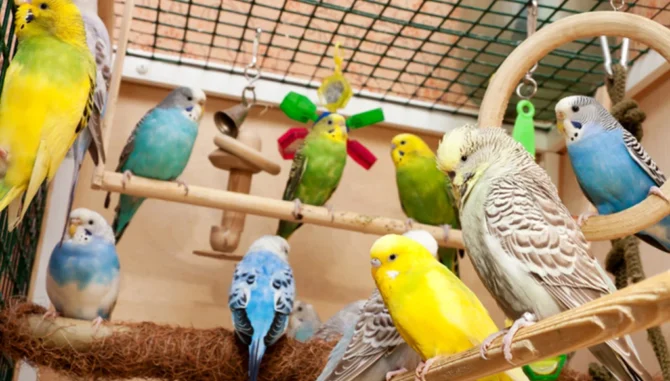Birds show a lot of behaviors, and these include frequent—sometimes rhythmic—singing at night.
While some folks don’t mind the sound, for others, it could be a constant source of frustration.
All that said, note that birds don’t chirp randomly. Just like humans have a reason for talking, nocturnal birds have a reason for singing. So we ask the question, why do birds chirp at night?
Some of the reasons nocturnal birds sing include finding a mate, locating their flock, warning others, or fighting off the feeling of disorientation.
In this article, we’ll explore the seven different reasons birds chirp at night, as well as what you can do if it has become a nuisance.
Why Do Birds Chirp at Night?

Finding a mate
Yes, sometimes that bird chirping close to your window is trying his luck at a potential mate.
Males of many bird species become more vocal during their mating season as they try to impress the female.
The chirping is often more pronounced, loud, and complex than normal. Many species even have different sounds for this period.
Chirping is the gauge for attractiveness, as the males who sing better are deemed more attractive than those that don’t.
This form of mating call happens more during spring, as that is the breeding period for many species.
You’d know you’re about to share your environment with a bird family when you hear this singing.
Food Search
The next reason birds chirp is because of their food search. This particular reason is multifaceted.
It could be that they are overexcited at having finally found food as they work hard for it, especially those that hunt.
Do you get excited when you see a well-cooked meal? Well, the same applies to these birds.
The chirping bird could also be signaling to other birds of its flock, something like “hey guys, I’ve found food.”
If the sounds come from many birds and sound like bickering, it very well could.
Then it could also be a male trying to show off to a female by proving he can get food.
Communication
Birds also chirp as a form of communication with members of their flock.
This is a common reason, and for the most part, those birds going back and forth are exchanging information. This often happens with migratory birds.
Nocturnal birds often migrate at night, going in flocks. Constant communication is necessary to ensure that every member is safe.
This happens especially when the birds are going through an unfamiliar environment.
During this moment, if you hear a very loud chirp, it could be that one bird has been separated from others and tries to reach them.
Danger
Does the bird’s chirp sound like a panic call? It very well could be. Faced with a predator, the bird could call out as a sign of fear.
It may also do so to warn others or to seek help. Chirping is a great survival skill for these creatures.
In return, you may hear other birds calling out to the distress call of one.
They may be trying to locate the lost bird or sounding aggressive to scare the predator away.
Disorientation
Diurnal birds sometimes chirp at night if they wake up suddenly at night. The feeling of disorientation is similar to that of humans waking up too early in the morning.
The loss of light and slight disconnect from the surrounding can make them chirp till they get their bearings.
It could also be that the urban lights make them think it is the day, getting them active too early.
They may also find nighttime more peaceful when they are away from the hustle and bustle of the city.
Song practice
Birds are natural singers, but they still practice to get better. This is especially true for the male, who needs to sound very melodious to be attractive to the female.
Babies also take the time to imitate their parents so they’ll know how to communicate with others.
Birds in the same community might also come together to practice the signal they’d use to communicate with themselves.
These signals are crucial for their survival, hence the need to be sure they are on the same page.
Babies
Besides males, baby birds are strong ‘culprits’ of chirping. For starters, they chirp for the same reasons a human baby cries.
Baby birds are dependent on their parents for their survival and nutrition, so they chirp to get attention, and their needs met. Hunger and discomfort are some other causes of chirping.
They may also chirp if they are alone or in need of protection, such as when a predator is stalking them.
So if it sounds like birds in a nest are panicking, you could go check. Who knows? You may be saving a bird’s life.
The final reason babies chirp is what we’re already mentioned. These birds may imitate their parents to learn how to signal.
Also See: Why Do Birds Chirp In The Morning? Why They Sing Dawn Chorus
How to Stop Birds From Chirping at Night

Some people are not perturbed by the sounds of nocturnal birds and may even enjoy it, but for others, it could be frustrating, especially when it is loud.
Also, some birds, like owls, make sounds that could be eerie to hear at night. Here are some tips to get better sleep:
- You can protect yourself from the sound using a white noise machine that covers the sound. You can find the app in a play store. Alternatively, a fan also provides white noise to drown out the sound of birds.
- You can also invest in some ear plugs which can block out the birds’ sounds. This is quite advantageous as it can also solve some other problems.
- Another solution is sleeping pills, but this should only be used if you realize there may be other reasons for your lack of sleep. You should also consult a doctor for an accurate prescription.
- Scarecrows and bird statues can also come in handy! It makes the birds assume the place is already occupied and may scare them off without harming them.
What you should NEVER do is try to harm or kill the birds. We do not advocate hurting any of these creatures, especially as they aren’t harmful or venomous.
Final Thoughts: Nocturnal Birds Sing at Night for Different Reasons
Birds can be quite vocal, and even the quiet ones will have moments of continuous expression.
There are various reasons for this, but all tie down to their survival.1
If you’re disturbed by the sounds of birds singing at night, there are very safe ways you can either protect yourself or get them off your property.
Next up…
- Why Do Birds Suddenly Appear? The Answer Is More Than A Song
- Why Do Birds Fly Into Windows? (The Sad Truth & Prevention)






